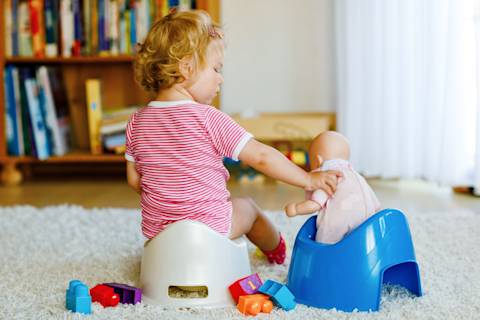Laying the foundation for routines and schedules early on will help you interact and respond better to your baby. Here are some examples to help get you started.

Often referred to as the “newborn fog” or the “fourth trimester,” the first three months of your baby’s life can be a flurry of sleep deprivation. Figuring out feedings and adjusting to a new life (literally and figuratively) are normal. How do I know when the baby is going to sleep? How often and how much does the baby need to eat? There are so many unknowns during the first three months because you and your baby are figuring each other out. Establishing routines can seem nearly impossible at first. But routines can organize this somewhat chaotic time for both you and your baby. Routines and structure help babies know what to expect, learn from their environment, and feel safe.
Follow your baby’s lead - Track when your baby sleeps and eats. You may start seeing patterns that will naturally lend themselves to a rough schedule. Similarly, if you have certain routines in your day that have to occur (e.g., taking an older sibling to school in the morning), then let those already occurring events start to create a schedule for you and your baby.
Take cues from your surroundings and times of day - From singing a special Hello Song to your baby when he/she wakes up to putting out a particular blanket when you do tummy time, sameness and consistency help us follow and prepare for routines and parts of our schedules. When your baby is about to nap, plan to be in a quieter space that is darker (e.g. a bedroom). If you plan to have time interacting with your baby, go for a walk outside and describe what you see to your baby. Changing your environment can help trigger that you are doing the next thing in your schedule or routine. New environments also give you more new opportunities to engage with your baby (e.g. new things to see and hear).
Routines are important - They can be specific to certain parts of the day (bedtime, bath time, etc.) Start by doing what works for you and your baby. Pay attention to what your baby tells or serves you, and let your response be attentive to your baby’s reactions.
Be flexible! - Babies change every day, especially during the first three months of life. If you notice a pattern, but then it changes, it’s okay. Go with the flow of what happens in your day. If you get thrown off your proposed schedule or routine, you can adjust the schedule or get back on track the next day. Just remember that routines and schedules are supposed to help you and your baby each day, not cause you more stress.
HELLO SONG: Here’s a fun “Hello Song” you can gently sing when baby wakes up (sung to the tune of “Mary Had a Little Lamb”): Hi, hello, and how are you? How are you? How are you? Hi, hello, and how are you? How are you today?







